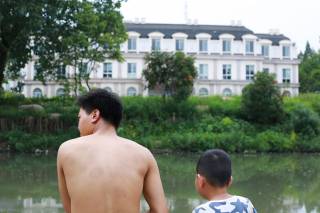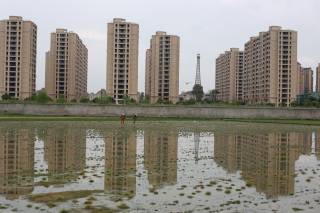Study China Programme
21 February 2019
Ido Vock was another UCL student who participated in the Study China Programme. He spent three weeks at Zhejiang University in Hangzhou and has written about the pros and cons of studying in one of China's largest cities.

Ido Vock, European Social and Political Studies
The Chinese are said to have a proverb which goes: ‘In the sky, there is heaven. On earth, there is Hangzhou.’ I not sure if I would go quite that far, but I’m at least willing to recommend the Study China programme, which allowed me three weeks of studying at Zhejiang University in Hangzhou, to UCL students.
Study China is organised by the University of Manchester and funded by the UK government’s Department for Business, Innovation and Skills. It runs biannually: a smaller-scale programme at Easter, and one in August, which I participated in this year. Accommodation, tuition, all group activities, and some food is paid for by the programme. Participants are required to cover the costs of travelling to China–flights, a visa, jabs, and insurance–and any extra spending money for travelling or souvenir buying. For the summer programme, students have the choice of applying to study in Beijing, Shanghai, or Hangzhou.
The main focus of the programme are the excellent 42 hours of spoken Mandarin classes. The vast majority of Study China participants are complete beginners. Progress is deceptively swift for a language with a reputation as devilish as Chinese, and by the end of the three weeks all ab initio students are able to introduce themselves, tell the time, and ask basic questions of an interlocutor.
The programme also includes six hours of a dubious ‘doing business in China’ course. This series of lectures is platitudinous and uninspiring, its tenuous insights assessed by a multiple choice exam with questions like: ‘In China, should a handshake be…? a) Limp and brief, or b) Firm and lengthy?’

Most days include a group excursion, mostly to local tourist sites like the historic West Lake. A particular highlight was a visit in groups of two or three to a local family, who invited us into their homes for a meal, and in most cases a trip to their favourite sights. In a country where authenticity is sometimes a rare commodity, the family visit felt like a genuine insight into the real lives of local people. Despite our appalling dumpling forming skills, my group was made to feel welcome in a Hangzhou family, who treated us to gargantuan portions of a dozen dishes of northern-style dumplings, lotus root, durian, and more, making for one of the most memorable meals I had in China.
Most aspects of the Yuquan campus of Zhejiang University, where I studied, are very pleasant. The campus is not too far from the West Lake and the Xixi wetlands, the main natural attractions in Hangzhou. All students were hosted in a clean single en-suite, a pleasant surprise after being briefed that we would be sharing double rooms. The university canteen is cheap, serving filling and reasonable-quality food for 16 yuan (£2) or less a meal. Even better was the hole-in-the-wall restaurant five minutes from my dorm, which does an unbelievably delicious plate of duck for only 12 yuan (£1.50). I visited perhaps a dozen times during my time at Zhejiang. Cheapish expat bars abound within walking distance, some at times offering free drinks.
Like everywhere in China, the contrasts in Hangzhou were sometimes obscene. In this officially Communist country, as foreign students, we were granted free entry into the glitziest clubs, simply because of the perceived glamour of our foreignness. At clubs like SOS, we gawped at the sons and daughters of party apparatchiks rubbing shoulders with K-pop stars, waited on by personal servers pouring bottles of imported Moët worth probably close to their month’s salary. Yet most Chinese could never dream of this lifestyle. Especially in metropolitan areas most live, if not on the breadline, then at least frugally.
Yet aside from the lavish clubbing, Hangzhou often feels like a regrettably lifeless city, despite being home to about 9 million people, roughly as many as London. It has a respectable historical heritage–for 150 years under the Song dynasty, it was designated the capital of China–yet there are vanishingly few areas where the charm of this rich lineage makes itself felt. Gao Xingjian was completely right when he wrote about the garish commercialisation of historical sites in China: first comes ‘a gaudy building, then a restaurant, and the scenic beauty of the place [is] utterly destroyed’.

Meanwhile, the vast majority of the city feels like all the other places in China which have experienced massive urbanisation in the past 25 years, with the same eight-lane highways, uninteresting office buildings, and identikit blocks of flats. Uniquely Chinese idiosyncrasies abound, like the ghost town suburb of Tianducheng, a knockoff Paris built in a rip-off Haussmannien style, complete with a fake Eiffel tower a third of the size of the real thing. But even the passing interest of this sham Neuilly-sur-Shangtang fails to mask that Hangzhou’s Middle China blandness has little on the urban vibrancy of Shanghai, or Beijing’s status as the cultural, architectural, and historical heart of the most populous country in the world.
There are, in fairness, some advantages to studying in Hangzhou. In my experience, food and drinks are far cheaper than in Shanghai and Beijing; locals are less accustomed to hordes of foreign tourists, and therefore their first thought is inquisitiveness rather than an inclination to rip you off; the absence of the crippling Beijing smog is not to be underestimated. Yet in retrospect, my only regret about participating in Study China was not putting Shanghai down as my top choice. I spent three weeks in Hangzhou and one in Shanghai; if I were to do it again with the benefit of hindsight, I would pick much the opposite.
 Close
Close

